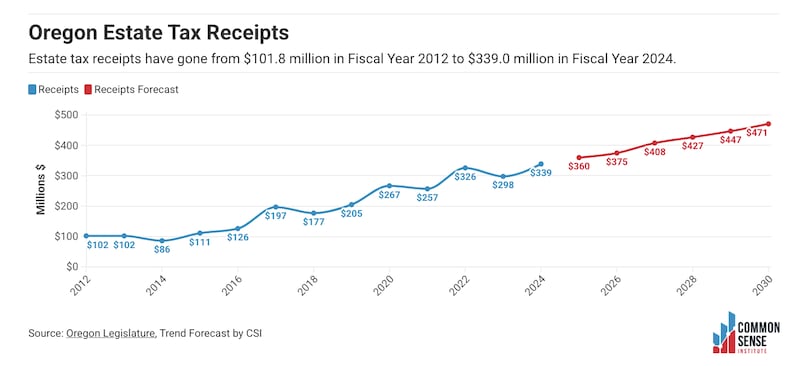High estate taxes are scaring rich old people out of Oregon.
That’s the conclusion of a new report by the Common Sense Institute of Oregon, a nonpartisan think tank “dedicated to the protection and promotion of Oregon’s economy.”
Older people who have amassed assets are leaving Oregon because the state is one of just 12 that has an estate tax, which, according to the U.S. Internal Revenue Service, is a tax “on your right to transfer property at your death.”
Oregon’s estate tax shoos wealthy people away because it has the lowest exemption threshold and the third-highest rate, the report says. That’s bad news for the local economy, because wealthy retirees spend money on things like theater tickets and restaurants. They also buy more mundane things like groceries.
If you die in the Beaver State and leave behind more than $1 million, the Department of Revenue will collect 10%. Leave more than $1.5 million, and ODR will take 10.25%. It goes up from there, topping out at 16% for anything over $7.5 million.
Like many taxes in Oregon, the estate tax isn’t indexed to inflation. The $1 million minimum is fixed, and inflation pushes more estates into taxable territory every year, Common Sense says.
“Not only is Oregon’s estate tax exemption threshold low relative to other states, but it is also fixed, remaining unchanged over time,” Common Sense says. “Since the threshold fails to adjust for rising inflation and growing wealth, Oregon’s estate tax will capture an increasingly large portion of the population over time.”
So far, that inflationary creep has helped send estate tax collections soaring from $102 million in fiscal 2012 to $339 million in fiscal 2024. If the trend remains intact, estate tax revenue will hit $471 million by 2030, Common Sense says.

That’s good news for the state budget, but it comes at a cost, Common Sense says. If the $1 million minimum remains in place, the estate tax will push 125,000 people out of Oregon by 2035. It will lop 59,000 people off of employment rolls, cut gross domestic product by $6.3 billion, and slash sales by $10.5 billion.
In Multnomah County, two other unindexed taxes threaten to sweep up more payers if inflation persists.
The county levies its 1.5% Preschool for All tax on all income above $125,000 earned by single people and $200,000 for married residents filing jointly. It takes another 1.5% on income over $200,000 for singles and $400,000 for couples.
Metro, the regional government, takes 1% of all taxable income over $125,000 earned by individuals and $200,000 for couples, and sends the money to the three Portland-area counties to spend on services for homeless people. Metro is mulling whether to index the tax to inflation as part of a reform that may be on the November ballot.
